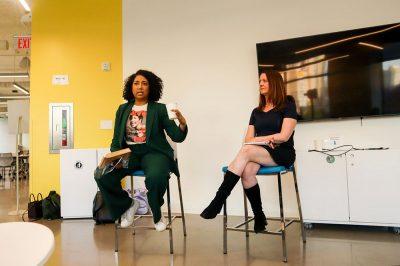Suzanne Sinatra recalled a story about using a bag of frozen vegetables to ease the second-degree burns she received from an unsafe Brazilian wax, the unspoken struggles of vulva owners streaming out in front of a crowd of students.

BU students attended a fireside chat organized by Innovate@BU on Wednesday with Sinatra, a young person of color and female entrepreneur in sex-tech — a niche in the manufacturing industry targeting sexual health and sexuality.
Historically, there has never been a product marketed toward vagina and vulva owners to relieve pain in those areas, Sinatra said. DIY solutions, like frozen bags and sanitary napkins soaked in witch-hazel, have been the only options, she said.
“I feel we were just using these archaic solutions to heal our private body parts,” Sinatra said.
Sinatra, the founder and CEO of Private Packs, never expected to become an entrepreneur but found herself establishing a successful startup despite living through a global pandemic and Stage 3 breast cancer.
“So not only did I have to deal with a lot of professional hurdles, I also had to deal with a lot of personal hurdles,” Sinatra said.
The idea for Private Packs — a hot and cold, ergonomic therapy pack for the vulva — developed after Sinatra’s hot wax incident, she said. The product helps combat cramps, UTIs, sex pain, waxes and other traumas, according to the company’s website.
Private Packs was launched online in January 2021 and distributed in CVS by February 2021. By July, Private Packs was on CVS shelves nationwide.
Originally an investment banker on Wall Street, Sinatra sought out in 2015 the mentorship of Anna Thornton, a professor of the Practice in Mechanical Engineering at BU. Thornton, who was the director of Quality and Engineering at Dragon Innovation at that time, said she was impressed by Sinatra’s product and passion, even though she was just breaking into the entrepreneurial field.
“She had learned an insane amount. She had done an incredible amount of work, and she was out there trying to find the resources to get this product off the ground,” Thornton said.
Natchaya Makjumroen, an attendee at the fireside chat and junior in the College of Engineering, heard about this event from Thornton and was compelled to attend because of Sinatra’s presence in a male-dominated field.
“I was just interested because I guess the woman in STEM aspect that you don’t really see a lot of female entrepreneurship around our age, and people who are really successful who are not that much older than us,” Makjumroen said.
Sinatra bootstrapped herself since the beginning, contributing all her savings — over $100,000 — to the budding company and paying dividends to only eight investors.
In addition, she personally vetted the factories for her gel packs, gel pack sleeves and packaging.
However, her battle with breast cancer put all company activity on a hold, and she was forced to practice self-care first.
“I felt like a fraud. I felt like I was telling people to look after their sexual health and then I didn’t,” Sinatra said. “I wasn’t checking in with my gynecologist every year because I was building a startup. I didn’t have time for that, and I didn’t make the time for it.”
While battling breast cancer just two weeks before the proposed launch date of Private Packs, Sinatra encountered other hurdles like fighting “naysayers” and harassment. She faced opposition from both female entrepreneurs who did not support the product and from male colleagues who displayed inappropriate behavior.
Ultimately, the company began to flourish, and so did Sinatra. She said she learned not to gloss over marketing, which she was guilty of in the beginning.
“In the beginning, I focused too much on making the product and not marketing the idea of the product,” said Sinatra. “And I didn’t build a community, which I’m doing now.”
Sinatra is dedicated to talking to customers one-on-one about their experiences and suggestions for Private Packs. She calls and has Zoom meetings with them, even just to check up on them or ask why they bought a Private Pack in the first place.
For Sinatra, the difficult part has only begun — maintaining the company is more taxing than the manufacturing side.
“Entrepreneurship is really hard,” Sinatra said. “It is kind of like a life sentence, but I wake up every day happy that I get to work on what I get to work on.”

















































































































